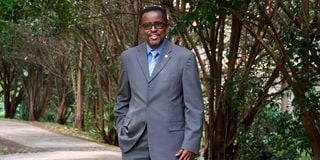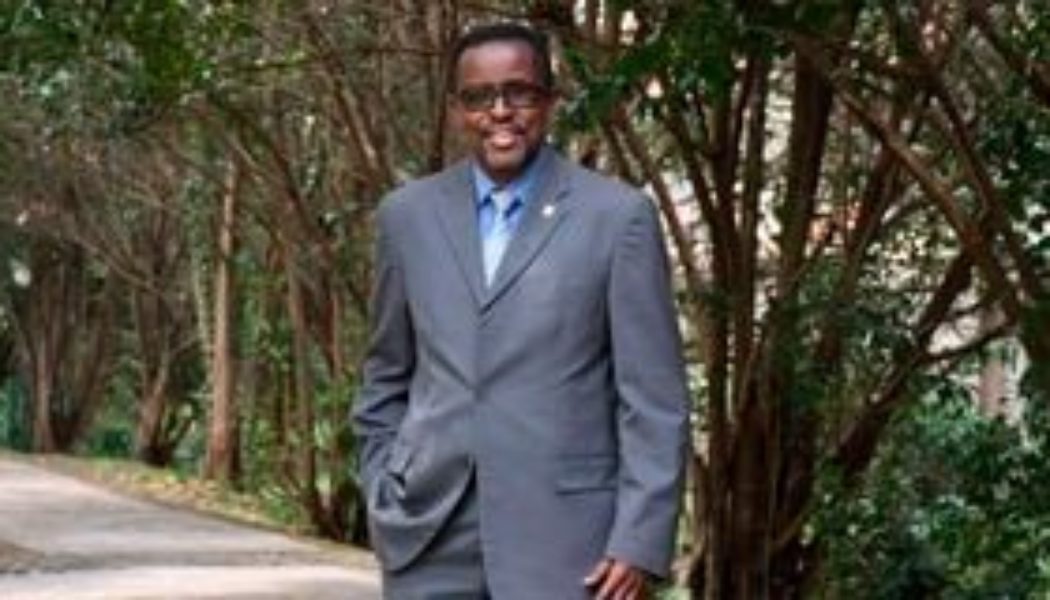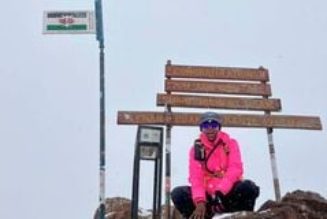Caesar Mwangi, the Executive Dean of Strathmore University is the son of a King. In 1993, he moved to South Africa for his Master of Business Administration (MBA) at Wits Business School. Even though apartheid was coming to its knees, it was still a white affair.
Black students studying MBAs were not many. Black Africans were even less. But not for a son of a King. The plan was to do two years and get out. He ended up staying for 11 years even though the environment wasn’t exactly very friendly for a foreign professional of his skin colour.
“In discomfort, you are forced to self-reflect and ask yourself ‘Will I survive this?” He says. “It made me question things and drove me to find out who I was. I read a lot to find answers. Caesar will easily lead you into a cerebral rabbit hole of ideologies and philosophies that are as tall as he is. At his very core, the Son of King is about truth. “Truth is the only rule of life,” he insists.
How did you end up as the Executive Dean? Must have been an interesting journey.
In 1993, I went to South Africa to do my MBA at Wits Business School. I was supposed to stay for two years but people told me, ‘Why do you want to come back here?’ There are no prospects. So, after I finished my master’s, I joined Deloitte in South Africa.
Bear in mind that South Africa became independent in 1994. I was the second black consultant in Deloitte at that time. It was a horrendous experience. They didn’t trust us, they were just colouring the office with black skin. Tokens. It was frustrating, man. I couldn’t accept that. So I left.
At that time, South Africa was looking for black professions. We were in high demand, you know, because everybody wanted to show that they’ve embraced the new dispensation. I was recruited as a finance director of a medium-sized organisation called Independent Mediation Services South Africa (IMSA). I was the youngest member of management, second only to the CEO in terms of seniority and being paid very well.
But again, respect was zero. I’d made it in life, but I was unhappy working there. I developed a migraine headache from the stress and after two years I exited. I had a decision to make; either return to Kenya or set up a consulting practice in South Africa and work for myself. I chose the latter. Guys thought I was crazy. Meanwhile, job offers kept coming. Huge job offers.
Raining job offers…
Oh yes. Huge premium pay because there were very few qualified MBA black students from good business schools. Consultancy was rough at the beginning but then I got so many referrals I couldn’t handle it. It picked up like crazy, man. So I spent seven years on that. Johannesburg was very kind to me.
At some point, I realised that I had to prove to those guys that I could get a doctorate in their country, finish it in the time required, and offer even better consulting services. I enrolled at the University of Johannesburg from around 2000, and I finished in 2004. Within that time, I got married and had three children while working and studying. Then we had a debate with my wife; where should we raise these children? Shou –
Wait, did you meet your wife there?
No, I came back in 95, married her, and went back with her.
You knew her before?
Yes. I had left here when I went to study. We had been dating. The reason why we had a debate was because in South Africa if you are a black foreigner you are a third-rate member. After all, the assumption is that you are running away from your poor country to the great South African nation to take advantage. To take ‘our jobs’. So I said, I won’t take your job. I’ll create jobs for you guys. I was fed up with these guys.
South Africans were very difficult because many of them were not educated. The whites were never working for a black consulting company. The blacks were not qualified. I grew up with consultants, so I had to get Zimbabweans and Kenyans and they worked very well and we provide a very good service. To cut a long story short, now, the question was, where should our children grow up?
We agreed to come back home where I joined a consulting with a group called the CGIR, a part of the World Bank Group.
I was based in Ethiopia. In 2005 the Stathmore University business school wanted lecturers who could start in 2006 to teach the first batch of MBA students. So, I started teaching in 2006, was CEO of Sasini Group later that year, regional director of Global Village Energy Partnership, then joined Sunny Money as CEO, and CEO of ICEA Lion Group up to 2022 before I became dean of Business School.

Strathmore University Business School Executive Dean Dr Caesar Mwangi.
Photo credit: Pool
You’ve done your time. And at what age now?
I’ve done my time. I’ll be 59 on October 31, 2024. I will be 60 next year.
Do you feel 60? What’s your internal age?
I don’t feel my age at all. I look at this age thing this way; if you take care of your body and your mind and your spirit, you feel good, you won’t feel old, you feel energetic, you’ll do what needs to be done. Body, mind and spirit.
What do you do for your body?
I exercise at least three, or four times a week. I run, I go to the gym. I do some light weight training. I walk, I hike. I’ve always done these things. There are two types of exercise. There is the exercise which is planned; like the gym. Then there is the ongoing exercise that you do in the course of your work. Taking the staircase instead of the lift.
My barber is in town, so I usually walk there from Lavington. I walk to meet my friends at Sagret Hotel. If we are meeting at the Impala Club, I will walk there. In airports, I use the staircase instead of the elevator. It’s a purposeful exercise. Then food in moderation. Your body doesn’t need too much of whatever you are eating.
What do you do for your mind?
I love to read. I discovered a long time ago that the mind is nourished by my contemplating truthful issues. Truth comes from reading good books and watching good movies. I studied philosophy and it helped me to be a critical thinker.And the issue of truth was part of the philosophy. What is truth? Truth begins with understanding who the human being is. When you nourish the mind, you understand who you are and your place in society, and therefore, how you should live.
There’s a fine line between truth and what people call religion, and religion from a point of view sometimes, of the study of religious truth, which is theology. There’s a little bit of connection in all that area and philosophy. There is chaos in the world because man has refused to focus on his True North.
When did you start tapping into these philosophies?
My journey in a foreign country, encountering challenges without social network support forced me to be very self-reflective and seek out knowledge and understanding, to navigate in discomfort, because it can be uncomfortable. In discomfort, you are forced to self-reflect and to ask, how will I survive this? When things were very tough hatred was directed at me. It made me question many things and drove me to find out who I was.
I read a lot to find answers. They hated us and it was the kind of sustained hatred that eventually got my migraines started because I couldn’t understand why they were so hateful and negative towards us. I realised they didn’t see who I was, they saw a black person. They didn’t see a son of a king, made in His image. Once you understand who you are, your potential and confidence is endless.
I listened to one of Martin Luther King’s speeches telling black people; Never forget your somebodiness, because these people don’t want you to believe in yourself. And that’s what happened to me in South Africa. I discovered that as the son of a King, I was planted here to serve the King and bring him glory.
What did you learn about money in South Africa when you found success as a consultant?
Wits University is one of the best business schools in South Africa. They had a 20 percent quota for black students in a class of 40. So that’s only eight blacks; five south Africans and three from elsewhere in Africa. It was highly competitive. Success was guaranteed upon graduation. You’d get a great job, drive a nice car, and live in a fancy house with a pool and tennis court. Most of my classmates ended up attaining that but I had reservations of a lifestyle of this nature, fuelled by a functional credit system. I call it the appearance of success.
I was clear I didn’t want any debt. So I bought a two-bedroom flat when I got married in a middle-class neighbourhood. Paid that off in three years.
My first car was a simple Nissan and the senior guy in the organisation one day asked me, “You are a finance director, why are you driving a Nissan?” I was happy with a debt-free life. I was sure that if I got into consumer debt like most people in South Africa, I would be stuck in a life of ostentation, in debt. I wanted to be free.
My lesson was clear from the beginning; let your money work for you, not work for your money. Money can enslave you. I know people with decent salaries but in serious debt.
From the outside, they look okay but inside their lives are in shambles with debt. The appearance of success.
What do you remember about your childhood?
It was very simple. We lived in a coffee plantation at the edge of Nairobi that is now Garden Estate. It was semi-rural. There were five of us. We didn’t have luxuries. My father was a civil servant, my mother was a teacher. So simple. We grew the food we ate. We had cows, goats, chickens and we took care of them there. I attended a government school, also here in Nairobi. then the Nairobi of University.
What do you struggle with right now at almost 60?
The loss of values in this country. People are conmen. You can’t trust mechanics or doctors. It’s so tragic and in the process, many people are very unhappy, and sad, because they’re just not aligned with anything good. It’s all about me, mine, myself.
One of the classes I run is Opportunities in Africa, where we discuss ethics in Africa about business. There isn’t any trust anymore, or integrity. We accumulate primitively. There is a total betrayal of trust amongst our leaders, they are here to amass wealth and power. To show off bundles of money and pretend to be generous. They show off their cars and palaces. They have misused the word honorable. It’s a joke because there’s no honour. That is what disturbs me. Because our children are watching us.









